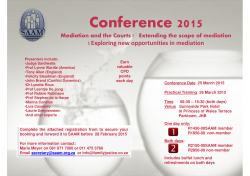
Mediation Roster - UN Peacemaker
United Nations Department of Political Affairs Mediation Roster The Mediation Support Unit (MSU), in the United Nations Department of Political Affairs (DPA), was established in 2006 to provide professional, cross-cutting support to “good offices” activities, including preventive diplomacy and the formal mediation of disputes. The Unit is designed as a centre of expertise for operational support to mediation efforts, a resource for strengthening the mediation capacity of regional organizations and Member States and a global repository of mediation knowledge and best practices. The MSU is a service provider to the UN system, regional organizations, Member States and relevant peacemaking entities. The operational capability of the MSU to undertake the above three tasks includes its UN Headquartered-based staff members, its Standby Team of Mediation Experts, and its Mediation Roster. Purpose Visit UN Peacemaker (http://www.peacemaker.un.org) the online mediation support tool developed by the UN Department of Political Affairs. Intended for peacemaking professionals, it includes an extensive database of peace agreements, guidance material and information on the UN’s mediation support services. UN Peacemaker is part of the UN’s overall efforts to support UN and non-UN mediation initiatives. Composition The rapid deployment of qualified mediators and experts is crucial for the success of peace processes. The SecretaryGeneral has highlighted the importance of civilian rosters and standby capacities in the immediate aftermath of conflict and has encouraged the development of expert rosters in priority areas (A/63/881S/2009/304, para. 64). Roster members are working for the United Nations, governments, academia and non-governmental organizations. They are mid- and senior-level professionals with a minimum of seven years of relevant professional experience, education in mediation and hands-on involvement in peacemaking processes. The Mediation Roster is a second-level response capacity which complements the MSU’s Headquartered-based staff and its Standby Team of Mediation Experts, both of which may be mobilized within 72 hours. When MSU staff or Standby Team members cannot be deployed, the MSU will identify and deploy a suitable expert from the Mediation Roster. The Mediation Roster is a niche roster focused on mediation expertise and consisting of approximately 300 qualified members. The background, skills and area of expertise of the members are as diverse as possible in order to respond to the different needs. The members are divided in the three following groups: The services provided by the Mediation Roster are twofold: the rapid identification and availability check (within 2-3 days) and deployment of mediators (within four weeks). 1. Senior mediators, deployable as lead mediators or special envoys; It serves three main functions: 1. Rapid response capacity intended to increase the quality of UN mediation processes through the identification and deployment of qualified mediators and mediation experts; 2. Second-level response capacity which complements MSU’s existing staff expertise and Mediation Standby Team capacity; 3. Strengthening the partnership in the mediation area between the United Nations and other relevant organizations. 2. Operational-level mediators, deployable as “chiefs of staff” or mediation team members assisting a senior mediator. They provide day-to-day management of the mediation process and remain in-country negotiating with conflict parties and managing the mediation team; 3. Technical-level experts are deployable to provide procedural and thematic advice on a full range of topics such as process design; constitutional issues; power-sharing; wealth-sharing and natural resources issues; security arrangements, and the incorporation of the gender dimensions and perspectives into the procedural and technical areas of the peace process. Visit UN Peacemaker: http://www.peacemaker.un.org @UN_DPA | www.un.org/Depts/dpa |1 United Nations Department of Political Affairs DPA works towards balanced gender and geographic representation of candidates on the Mediation Roster. Special emphasis is put on the identification and promotion of mediation expertise coming from the “Global South” and the integration of women mediation practitioners. In addition, MSU actively seeks candidates with expertise in gender issues related to mediation with regard to different thematic areas, such as process management and planning. Mediation Roster Administration Experts are selected for the roster after being referred to MSU by UN staff or by MSU partners. A Mediation Roster Panel is put in place to vet the candidates and to decide on who should be invited to join the Mediation Roster. It is important to note that being selected for the Mediation Roster does not guarantee actual deployment or generic training opportunities. may also be deployed in response to a request by Member States, regional or subregional organizations and nongovernmental organizations. The experts can be deployed in various ways: 1. Field missions (e.g. supporting ongoing mediation activities); 2. Teaching and training activities (e.g. mediation training, facilitation and development of workshops); 3. Long distance advice and backstopping (e.g. advice on thematic issues); 4. Research activities (e.g. development of options papers). The funding and deployment modalities for a requested mediation roster member are determined on a case-by-case basis. Requesting an expert Requests for the services of the Mediation Roster can be made by contacting the DPA/ PMD/MSU. The primary clients of the Mediation Roster are UN Envoys, Special Representatives and Resident Coordinators, Special Political Missions and peacekeeping missions. Other partners from the UN system can also benefit from the services provided. Roster members For further information or to discuss possible support, please contact the Chief MSU Robert Dann at dann@un.org (+1-212-963-7603) or dpa-mediationroster@un.org Visit UN Peacemaker: http://www.peacemaker.un.org @UN_DPA | www.un.org/Depts/dpa |2
© Copyright 2025









